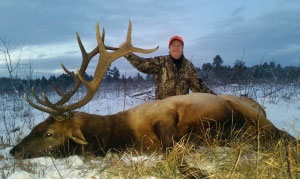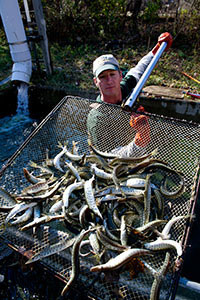- Details
Having hunter withdrawals? The Dowagiac Conservation Club’s annual Hunter’s Rendezvous slated for Jan. 28 may help cure that.
The Rendezvous is mini outdoor show of sorts, to include activities for adults and youngsters, a silent auction fund-raiser, exhibits by conservation groups, and more.
Hunters can get their bucks officially scored by several trophy organizations and an antique gun appraiser will be available. Visitors also can experience the club’s virtual reality hunting equipment.
- Details
(Provided by MDNR)
Chronic wasting disease was confirmed this week in two female deer from a Mecosta County deer farm. CWD is a fatal neurological disease that affects white-tailed deer, mule deer, elk and moose. This is the second time the disease has been found in a farmed deer facility in Michigan. In 2008, a white-tailed deer from a Kent County deer farm tested positive.
"Chronic wasting disease is a serious disease affecting both farmed and free-ranging deer," said MDARD State Veterinarian James Averill, DVM. "We are following the state's CWD response plan and taking the necessary steps to protect the health and well-being of all of Michigan's deer populations."
Samples from the two deer were submitted for testing as a part of MDARD's mandatory CWD surveillance program. All farmed deer facilities licensed with the Michigan DNR must participate in this program.
"Any discovery of chronic wasting disease in free-ranging or farmed deer is disappointing," said Chad Stewart, DNR deer and elk specialist. "It will take significant time and effort ñ through immediate, targeted surveillance and mandatory checks during the upcoming deer seasons ñ to understand the current situation. The Michigan DNR remains committed in our efforts to contain this disease and safeguard our valuable wildlife resource."
- Details
(Provided by MDNR)
 Elk Hunters Had Successful SeasonMichigan's latest elk hunting season - considered the late or December hunt ñ is complete, and preliminary hunting results are in. A total of 100 state licenses were available, 30 any-elk and 70 antlerless-only licenses.
Elk Hunters Had Successful SeasonMichigan's latest elk hunting season - considered the late or December hunt ñ is complete, and preliminary hunting results are in. A total of 100 state licenses were available, 30 any-elk and 70 antlerless-only licenses.
"Fortunately, because of the nature of our elk season, we are really able to work closely with hunters," said Department of Natural Resources wildlife biologist Shelby Hiestand. "The December hunt had a 92-percent success rate for our state hunters, which is great."
During the nine-day hunt period, running Dec. 10-18, 54 cows, 29 bulls and nine calves were harvested. Weather was favorable, with some snowfall just before the season making it easier to track and see animals within the elk hunt unit.† The December season allows hunters to take an elk within any elk management hunting unit, maximizing the 10-county hunting unit at the "tip of the mitt" of northern Michigan.
- Details
(Provided by MDNR)
 Michigan Muskie Program Creates Opportunities StatewideThe Michigan DNR stocked 25,740 muskellunge fingerlings into 12 waterbodies located throughout the state last year in an effort to further enhance Michigan's world-class fisheries.
Michigan Muskie Program Creates Opportunities StatewideThe Michigan DNR stocked 25,740 muskellunge fingerlings into 12 waterbodies located throughout the state last year in an effort to further enhance Michigan's world-class fisheries.
Michigan is home to two strains of naturally reproducing muskellunge, Great Lakes and northern. The DNR has been rearing muskellunge in its hatcheries since the 1950s. While the hatchery program initially focused on the northern muskellunge strain, it has shifted focus in recent years to the Great Lakes strain, as it is native to Michigan and widely distributed in waterbodies throughout the Lower Peninsula and eastern region of the Upper Peninsula.
Since 2011, the DNR has collected eggs and milt (sperm) from adult muskellunge in the Lake St. Clair/Detroit River system. The offspring then are reared at Wolf Lake State Fish Hatchery in Mattawan. This hatchery is the only facility in the state currently capable of rearing this species. The muskellunge are reared in hatchery tanks and then transferred to outside ponds after a few months.
- Details
(Provided by the club)
A new Wobble Trap Course at the Berrien County Sportsman's Club in southwest Michigan is available to the public.
The project was in the works for several years, and finally started to come to reality in July under the guidance of Trap and Skeet Chair Tom Holt, who says demand for this type of course in the area was high.
"The most competitive people I've ever met are Trap shooters," said Holt. "Trap shooters are rabid about the sport. I encourage everyone to come out and shoot, whether they are experienced in Trap or not. The point is to come out here and have fun."


